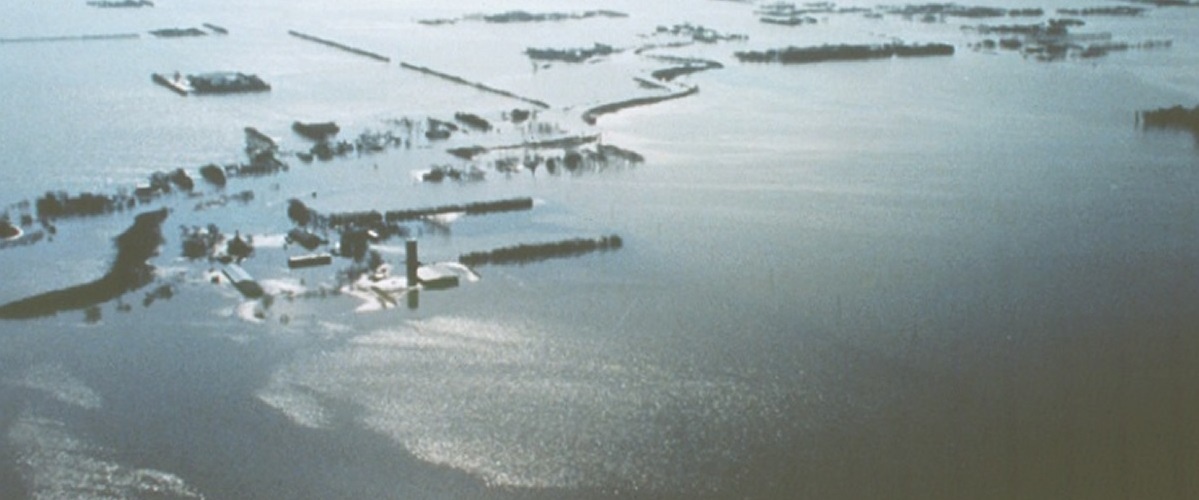
The temperature is warming, and grass is peeking out from long-unseen lawns, bringing on grateful thoughts of spring as those of us in the True North bid au revoir to a long winter. Though the statistics don’t support it, it seems as though winter gets longer with each passing year. So the coming of spring has the ability to change most of ours moods—and minds. We watch weather forecasts not with the dread of January but with the optimism that comes from seeing numbers that don’t have a minus sign in front of them.
This is all deeply rooted to the love-hate relationship we have with the land we have chosen to live on. And its climate! We as Canadians, and specifically as Manitobans, take a sometimes unhealthy pride in our ability to “weather the weather” and the adversity it brings.
Yet for those living in the fertile valleys and lakebeds of the former Lake Agassiz, discussions of the daily weather are supplemented with flood forecasts and discussions around late-season snowfall and the pace of the melt. Predictions are reported and compared to past years. Inevitably, we think bank to what happened in 1997 and 2009. And of course the elders of our communities remember floods from even further back.
While long-time residents of our area have become as proficient as hydrologists at predicting floods, both official and unofficial monitors of our shifting water levels are destined to struggle. We live in an era of unprecedented weather patterns—or lack of patterns—brought on by climate change.
Note: deniers of climate change can stop reading here.
At this time of year, people often have discussions about the prudency of living on a flood plain and whether this continues to be a responsible choice. When we analyze the amount of preparation that goes into flood protection, and the resources we are forced to use in the process, we have to ask some tough questions. Is this the prudent use of our collective time and money?
Historically, the settlement of this area was driven by agricultural realities. Our fertile fields offer some of the best growing conditions in the province, and so towns were built around these agrarian enterprises to service the needs of those who settled here.
It may be a sore and sensitive subject for many to contemplate, but if we had known then what we know now, would we have still chosen to locate our population centres in the same locations? Likely not. The locations of our towns and cities were based on factors like transportation along water routes and proximity to farms.
Obviously the idea of shuttering our communities and moving them is neither palatable nor practical. It’s true that in the early stages of railroad development, many towns were in fact “transported” a few miles down the road to be better situated, but this was at a point when those towns were little more than a tiny collection of houses and buildings built by speculators.
Our communities today are not only larger and more established but have also significantly invested in flood protection. As such, our discussions centre more around future investment in flood protections and continued development.
These ever-increasing investments come at the expense of the taxpayer, of course, and so the struggle will continue in the coming years—and more questions will be raised.
To date, our investments will cover us in the event of once-in-a-century flood events, and so perhaps these questions are moot for many. Yet we know that we are not covered for the eventual “big one.” By tracking the historical record, we know there will be a flood coming large enough to breach even our best-prepared levees, just as people living atop fault lines are aware of an impending earthquake that will heap devastation on them.
The rapid rise in extreme weather, and the difficulties associated with predicting it, make this question increasingly current and relevant. We see the effects of this on our infrastructure all the time, although on a smaller scale. For example, window wells that are properly engineered yet overflow in the event of extreme rain. Or consider our storm sewers, which meet all specifications yet still back up in a torrential downpour.
This lack of predictability may challenge our flood controls sooner than we think.
Speaking as a resident of this flood plain, these concerns don’t make me want to abandon my community. But they do add fill me with a sense of pragmatism when it comes to issues of community development, government expenditures, and risk management. It’s not a sense of doom, but rather one of caution and vigilance.
Everything we do comes with varying levels of risk, and this cannot be avoided. We should view the constant risk of flooding like everything else in our lives and eliminate risk where practical and be prepared to minimize risk, and face tough choices, otherwise. Even when those choices aren’t palatable.




















